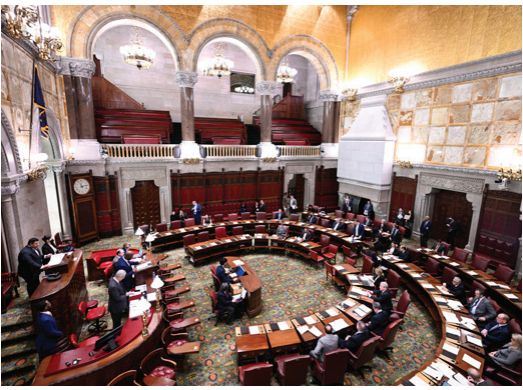- within Antitrust/Competition Law topic(s)
- with Inhouse Counsel
- in Asia
- with readers working within the Law Firm industries
- in Asia
- with readers working within the Law Firm industries
- within Law Practice Management and Coronavirus (COVID-19) topic(s)
In June, the New York State Senate passed perhaps the most comprehensive and aggressive state antitrust bill in more than a century. The State Senate's passage of the bill comes amid increased focus on state antitrust enforcement, both in New York and in numerous state legislatures across the country.
In January, the State Senate introduced the Twenty-First Century Anti-Trust Act (SB 335), an amendment to New York's General Business Law, which focuses on two areas of reform: (i) modernized and broad restrictions on perceived dominant firms (applicable to companies with as little as 30 or 40% market share) and (ii) a sweeping pre-merger notification requirement. On June 5, the State Senate passed SB 335 by a vote of 38-22.
If enacted into law, SB 335 would introduce robust and sweeping changes to New York's 126-year old Donnelly Act, which currently regulates antitrust. The amendments would significantly broaden the range of activity that is regulated by New York's antitrust laws and enforceable by the state and private plaintiffs.

New York Senate Chamber
When the Assembly returns to session, likely in January 2026, it will consider SB 335, and if that body approves it, the bill will be sent to Gov. Kathy Hochul for signature.
The New Law Intends to Regulate Monopolies, With a Much Lower Threshold for "Dominance" Than Federal Law
Underscoring concern with the "growing accumulation of power in the hands of dominant corporations," across various sectors, SB 335 focuses on the need to police abuses of companies accumulating what the drafters deem to be too much power.
SB 335's sponsor, State Senate Deputy Majority Leader Michael Gianaris, has explained that New York's operative Donnelly Act, which governs conduct only involving two or more entities, does not address companies in the digital environment that engage in harmful unilateral behavior. (Full disclosure: Gianaris is a longtime friend of Jason P.W. Halperin, a co-author of this piece).
For example, Gianaris noted that a powerful search engine can favor entities in which it has a financial interest by placing those entities higher on the results list, to the detriment of consumers and competition. Id. The Donnelly Act—enacted in 1899—well before the dawn of the consumer radio, let alone the internet, does not cover such unilateral conduct.
SB 335 seeks to address the drastically changed landscape by including a state law equivalent to the federal antitrust act's ban on monopolization (and attempted monopolization) and prohibiting "abuse of dominance." The bill's "abuse of dominance" standard, long applied by the European Union, prohibits any single entity with a "dominant position" in a relevant market from "abusing" that dominant position. Imposing a lower threshold than federal law, the bill presumes that sellers with more than 40% market share and buyers with more than 30% market share are dominant.
Under the proposed statute, examples of illegal activity include using a dominant position to impose tying or bundling requirements (i.e., when a seller conditions the sale of one product on the buyer's agreement to purchase another, separate product from the seller), exclusive dealing restrictions, and non-compete agreements, as well as any action the attorney general determines through rulemaking to pose a "substantial risk of harming competition" or that "serves no legitimate business purpose that cannot be achieved in some less restrictive way." SB 335 § 340.2(c).
The bill already has serious opposition. Indeed, the bill faces criticism from groups such as the New York Bankers Association and the Business Council of New York State, which have cited concerns over the lowered threshold for antitrust enforcement and the allowance of class-action lawsuits for violations of the proposed regulations. These opponents assert that SB 335 will discourage job creation and business investment.
In contrast, supporters of SB 335 claim the bill will help small and medium-sized businesses that are being squashed by big players. Gianaris has explained that "the laws as they exist don't contemplate or think about . . . the current digital environment" and SB 335 would make New York's antitrust laws apply to today's environment.
The New Law Would Enact a Sweeping Pre-Merger Notification Requirement
SB 335 also introduces the most comprehensive pre-merger notification program of any state in the country.
Currently, numerous states require companies who are thinking about merging to notify their state attorneys general in advance for health care transactions with local impact. In April, the Washington State enacted the first industry-indifferent filing requirement, extending to non-healthcare transactions with a sufficient nexus to the state.
To date, six additional states plus Washington, D.C. have introduced similar bills seeking state access to pre-merger filings at the same time as notification to the federal antitrust agencies so long as there is a sufficient connection to their state. Specifically, the requirements would apply to parties whose principal place of business is in the enacting state or parties whose net sales in the enacting state of goods or services involved in the transaction are at least 20% of the federal filing threshold.
SB 335 omits these limiting criteria by requiring "[a]ny person conducting business in the state" who is required to file notification of a proposed transaction with the federal antitrust agencies to simultaneously provide the same notice to the New York Attorney General, with some exemptions. Subpart 11(b) of SB 335 lists exemptions specific to certain classes of New York transactions, including, for example, transactions related to businesses directly regulated by the New York State Liquor Authority and the creation, production, and dissemination of copyrighted work. Failure to comply can lead to penalties of up to $10,000 per day, which can be recovered in a civil action brought by the New York Attorney General.
Additionally, SB 335 requires the New York Attorney General's Office to consider each transaction's effect on labor markets and workers, a consideration first incorporated in the Department of Justice's and Federal Trade Commission's most recent 2023 Merger Guidelines governing federal agency review of proposed transactions.
What Comes Next
If passed, SB 335 would work in conjunction with the federal Sherman Antitrust Act, under which federal antitrust agencies have recently pursued tech giants such as Google and Amazon for alleged abuse of their dominant positions. At times, and as noted above, in some respects SB 335's reach is broader than courts' interpretation of the Sherman Act, given the lower threshold for dominance. This means that New York State regulators and private plaintiffs could conceivably pursue alleged antitrust violations under this new law for behavior that is not currently regulated federally. SB 335 encourages private as well as public enforcement of the law by allowing both the New York Attorney General and private actors to sue businesses that violate the dominance provisions of the measure. The bill also provides for treble damages and reasonable attorneys' fees.
If SB 335 becomes law, we can expect that private actions will be pursued by individual plaintiffs, corporate plaintiffs, and class action plaintiffs. Many interested parties will watch closely to see how SB 335 fares with the New York State Assembly, and then possibly, with Hochul. If passed, this law would mean highly significant, landmark reforms to New York's antitrust laws, and thus, a markedly different landscape with considerably greatly regulation for companies who do business in New York State.
Originally published by New York Law Journal.
The content of this article is intended to provide a general guide to the subject matter. Specialist advice should be sought about your specific circumstances.





